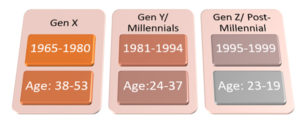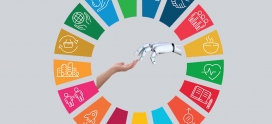Engaging work force MMXX
Companies in 2020 will find that they are dealing with a complex workforce of different generations with varied expectations and needs. Data shows that as of 2020, 50% of the working population in companies will be millennials (Gen Y). Deloitte did a survey to understand the wants of a millennial and the post-millenial Gen Z to be able to engage with them more effectively. Are aspirations of these generations very different? Perhaps not.
The survey suggests a number of similarities between millennials and previous generations. They would like to be associated with an organisation that they can be proud to work for and which reflects their own values.
BUT.. there are a few distinct characteristics that differentiate Gen Z from Gen Y.
Gen Z grew up with tech gadgets and social media. They’ve spent more time glued to their screens and less time outdoors socializing and developing social support systems than their millennial predecessors. Although more research needs to be carried out on the subject, initial reports suggest that Gen Z is more likely to experience depression as compared to previous generations. Another distinct characteristic is that Gen Z is much more creative and entrepreneurial minded.

Keeping the above facts in mind it may be important for companies to initiate more out bound experiential programs, recreational activities which will force the youth to take off time from their desk work. Companies like 3 M, DreamWorks encourage entrepreneurship. They permit employees to set aside a fixed percentage of their job time to pursue ideas and endeavors that are unrelated to their primary jobs.
Raised by conscientious parents who encourage empowerment and ethical values, the new generation wants employers to incorporate values and ethics in their business model, not just work for profit. This has given rise to a breed of employees who are hardworking and conscientious. They want to make their mark, by making our society better than past generations.
According to a survey in 2017 by Cone Communication, 94% of Gen Z believes companies ought to address social and environmental issues (As compared to only 87% of Millennial) The study throws up interesting insights on topics such as Climate which was the bottom of millennials’ personal concerns last year, has ended this year in a statistical tie with terrorism as the top concern for millennials in developed markets. Climate also was a top-five concern in emerging markets. Income inequality and unemployment were high concerns in both markets. According to the Deloitte survey, 70% of millennials interviewed said that a company’s commitment to CSR influenced their choice for work.
Does a good CSR strategy Work?
Yes, says CEO of Unilever Paul Polman who is convinced that Unilever ranks as the 3rd most popular employer because of their CSR and their links with employee engagement.
Companies are getting innovative to retain talent and are linking them to CSR activities. For example, in the US, Salesforce employees receive six days of paid volunteer time off a year, as well as $1,000 a year to donate to a charity of their choice. Epic Systems Corporation offers employees a paid four-week sabbatical to pursue their creative talents after five years at the company. Companies like Mercedes – Benz & Virgin are following a new trend called unlimited volunteering, where employees are given unrestricted time off from work to volunteer. Google, for example allows its workers to devote up to 20 hours of work time to volunteer efforts each year and awards $50 to nonprofit organizations for every 5 hours that Googler spends volunteering for a particular organization. Global net working major CISCO Systems Inc. has taken up a “Time2give” initiative, under which employees can take upto 5 days off in a calendar year, with pay, to give time to a cause of their choosing. SAP India, encourage employees to take one or two weeks off and work with a non profit to create technology platforms to manage their expansion plans.
A well thought out CSR strategy forms a fabric of the organization’s culture. It can build brand loyalty, raise awareness and strengthen the company’s reputation. CSR initiatives could focus on employee giving, community partnerships, local involvement, philanthropy and volunteerism. CSR activities could provide a platform for developing numerous skills like leadership, empathy and teamwork in a non-judgmental way. It provides a platform for problem solving situations and thereby becomes a good ground to unlearn and learn.
Companies need to work through the complexity of having both the millennial and Gen Z in their workforce. Just like customer segmentation strategies are done to understand the orientations of their customer base, similarly there is a need to segment the work force and understand their needs. It is important to have a well-articulated CSR, which the employees can engage and be part of it. Companies have the potential to use CSR activities with flexibility to engage employees from different generations and in different stages of their life‑cycle. Employee engagement is enhanced when employees participate in CSR activities, which create a sense of pride and identify themselves as part of the company. CSR is an efficient tool to provide a fulfilling work life experience.




